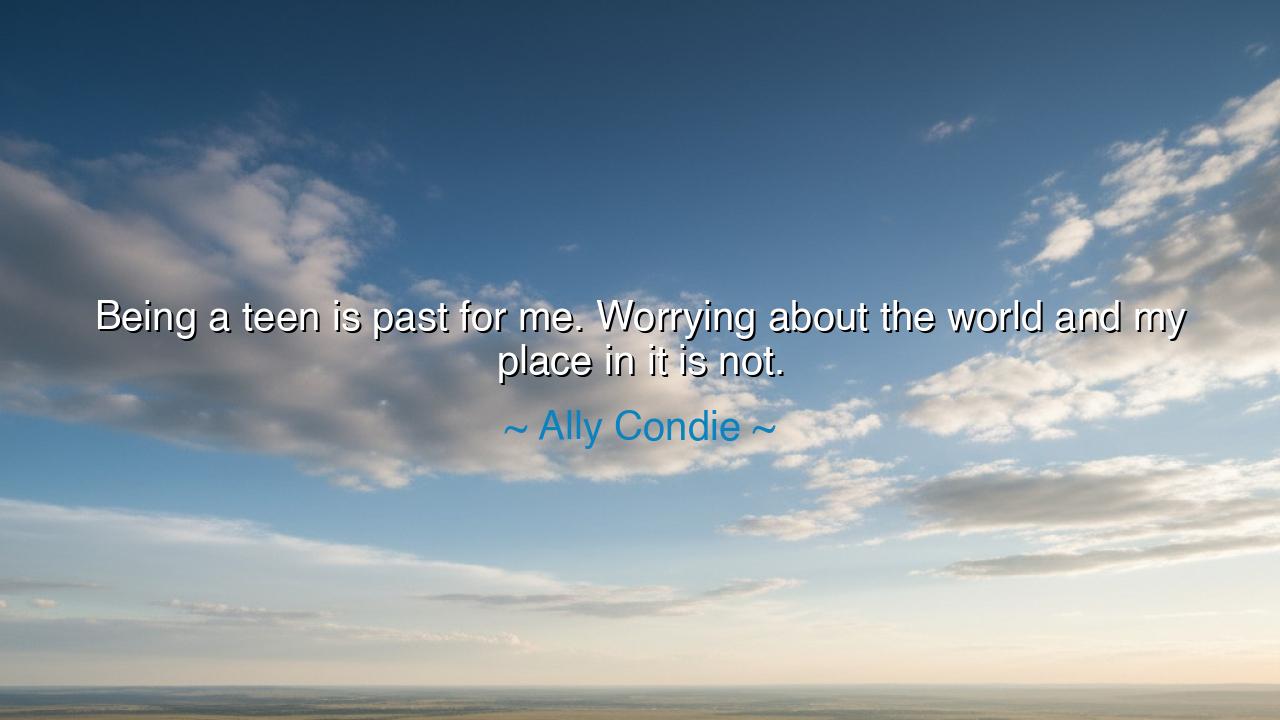
Being a teen is past for me. Worrying about the world and my






Ally Condie once declared with quiet wisdom: "Being a teen is past for me. Worrying about the world and my place in it is not." These words remind us that while the years of youth are fleeting, the questions that haunt youth never truly fade. To wonder about identity, to wrestle with purpose, to fear and to hope for the state of the world—these are not concerns confined to adolescence. They are the burdens and blessings of every stage of life. Condie speaks as one who has grown beyond the storms of teenage years, yet who still carries the eternal search for meaning in her heart.
The origin of this thought comes from Condie’s life as a writer, especially as the author of Matched, a dystopian novel that explores the tension between individuality and societal control. In shaping such a story, she reveals her awareness of the universal struggle to find one’s place in the world. Her words reflect her recognition that even after the awkwardness and intensity of the teen years have passed, the deeper questions remain: Who am I? What is my role? How do I live in harmony with others while staying true to myself?
History offers us countless examples of this truth. Consider Marcus Aurelius, who as a youth was trained to rule but who, even in his later years as emperor, wrestled in his Meditations with the same questions of duty, identity, and belonging. Or recall Virginia Woolf, who, long past her own youth, wrote of the struggle to find “a room of one’s own”—a place not merely in a house, but in the vast and indifferent world. Their lives show us what Condie herself affirms: that to search for meaning is not a youthful phase, but a lifelong endeavor.
Her words also remind us of the continuity of the soul’s journey. The teenager worries about fitting in at school; the adult worries about fitting in at work, in family, in society. The stage changes, the stakes shift, but the questions remain the same. What Condie reveals is that these anxieties are not signs of weakness but of humanity itself. To worry is to care, and to care is to be alive and engaged with the fate of the world and the shaping of the self.
At the same time, her statement carries a note of hope. For if the questions never end, neither does the possibility of growth. Each season of life offers new answers, new insights, and new ways of seeing. The worries of youth may feel chaotic and unbearable, but as one matures, those same worries transform into deeper wisdom. One learns that uncertainty is not the enemy, but the companion of growth. Thus, Condie’s words are not a lament but a reminder that life’s search is unending—and therein lies its beauty.
For us, the lesson is clear: do not despise your worries about purpose and place. They are not signs that something is wrong, but proof that your spirit is awake. Embrace them, reflect upon them, and let them shape your path. If you are young, know that the questions you ask now will remain with you, though their form may change. If you are older, do not think it strange that you still wonder about your role in the world—this is the eternal work of the soul.
Therefore, children of tomorrow, carry Condie’s words as a lantern. Do not expect to outgrow the search for meaning; expect only to grow deeper into it. Let your worries refine you rather than paralyze you. Let them push you toward compassion, justice, and authenticity. For though youth fades, the quest for belonging and purpose endures until the end of days. And this quest, though heavy, is the very thing that makes life sacred, noble, and worth living. The search does not end—it is the path itself.






AAdministratorAdministrator
Welcome, honored guests. Please leave a comment, we will respond soon